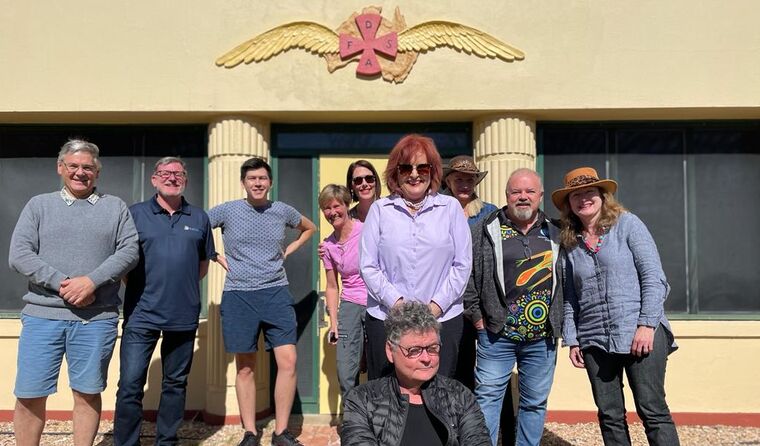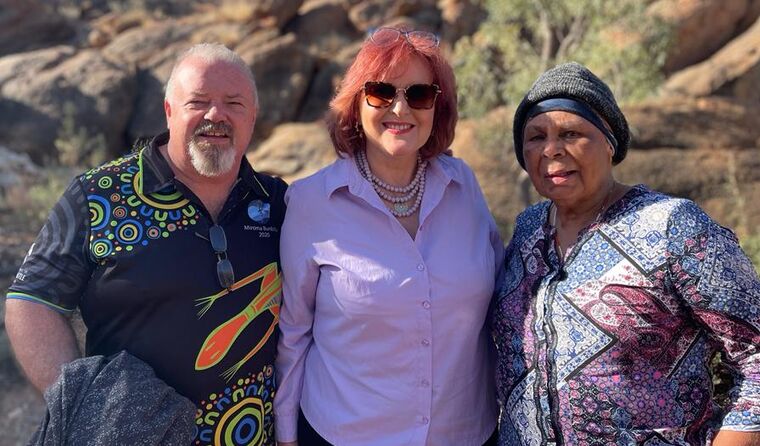Feature
Connecting with Country: Alice Springs visit continues
A tour of the RFDS and joining a storytelling circle with a local Indigenous Elder has helped strengthen RACGP links with rural NT.
 The RACGP Board and Executive team have been on a fact-finding mission in Alice Springs to better understand challenges faced by rural and remote GPs in the Northern Territory (Images: Morgan Liotta)
The RACGP Board and Executive team have been on a fact-finding mission in Alice Springs to better understand challenges faced by rural and remote GPs in the Northern Territory (Images: Morgan Liotta)
On a sunny Tuesday in Alice Springs, the RACGP Board and executive team members embarked on a tour of Alice Springs, known traditionally as Mparntwe.
The day began with a walking history tour of the Royal Flying Doctor Service (RFDS) museum at the original Alice Springs base – one of four bases across the Northern Territory and South Australia, comprising Adelaide, Port Augusta and Darwin.
Local doctors and nurses come from the Medical Retrieval and Consultation Centre (MRaCC) at Alice Springs hospital to provide 24-hour primary emergency retrievals and inter-hospital transfers across an area of approximately 1.25 million square kms.
In 2021, the four bases provided care to around 1000 patients daily – equivalent to one person every 20 minutes – with 100 per day across the NT.
RACGP SA&NT Faculty Chair, Dr Danny Byrne, told newsGP the tour was ‘an eye opener’ for the Board.
‘What an amazing job they do,’ he said.
‘Primary healthcare is actually one of the biggest jobs the RFDS does in the rural areas – and so many of our GPs and registrars do work for the RFDS.
‘It’s really good to see that they’re doing primary healthcare, in addition to the emergency work and mental health care for patients.’
 The RACGP Board at the Royal Flying Doctor Service museum. (Image: Morgan Liotta)
The RACGP Board at the Royal Flying Doctor Service museum. (Image: Morgan Liotta)
Petitioning to establish a flying medical service was first proposed in 1916 by Reverend John Flynn, after he witnessed the challenges people living in remote areas faced when trying to access healthcare.
In 1928 the world’s first purpose-built medical aircraft took off to provide healthcare to these areas.
In the nearly 100 years since that day, the RFDS has expanded considerably and now operates a fleet of 75 aircrafts delivering care to more than 370,000 patients. Each plane is fitted out like a ‘flying ICU’ with doctors, nurses, medical equipment and stretchers.
In addition to providing fly-in and fly-out clinics, the RFDS provides emergency services, mental and oral health, education programs and non-urgent transport.
With around one third of Australia’s population in rural and remote areas, the RFDS is ‘a lifeline’ for rural and remote Australia.
RACGP Rural Chair Dr Michael Clements, who flew his own plane from Townsville into Alice Springs for the event, describes himself as an ‘unofficial flying doctor’.
Equipped with a medical chest in his small plane, Dr Clements said he prefers to ‘be a doctor at the front of the plane, rather than the back’ and is on hand to help rural towns when he can.
For the second event for the day, in the afternoon the Board and executive team were met by local Aboriginal Elder woman, Kumalie Kngwarraye, who led a walking tour through the Olive Pink Botanical Gardens.
After experiencing spectacular views at the top of the walking hill, a storytelling circle was guided by Kumalie where attendees learned about the rich local history and connection to country of the Arrernte people, bush medicine and the power of kinship.

Professor Peter O’Mara and Adjunct Professor Karen Price with local Aboriginal Elder, Kumalie Kngwarraye. (Image: Morgan Liotta)
Wiradjuri man and RACGP Aboriginal and Torres Strait Islander Health Chair, Professor Peter O’Mara, told newsGP the experience helped to make ‘on-the-ground’ connections.
‘Alice Springs is a very special place. It’s a spiritual place with a lot of history,’ he said.
‘Experiences like today will help us start to get a sense of those things and round off a lot of what we do. The college really has shown an amazing commitment to Aboriginal Torres Strait Islander health, and has done so for over 20 years.
‘We’ve always worked hard and have been leaders in the space all the way along. And adding this cultural experience for people [on the Board] helps change the lens that you see the world through.’
Professor O’Mara said there is always more to learn and connect with.
‘Even though I think our Board are really good at advocating for Aboriginal and Torres Strait Islander people and what we need to do around health in that perspective. [Experiences like today] are just another step forward in changing the lens that we seek to work through,’ he said.
‘Every day I learn stuff. Some people often think of me as an expert in my area, but you’re always learning and that’s part of our culture too, and that was mentioned today.
‘When you’re not learning you’ve got to wonder what you really are doing, or if you perceive yourself to be an expert in something, do you really have the right lens?’
Kumalie spoke to the group about bush medicine and the plants and animals that the Traditional Owners have long been using for healing, as she passed around lotions, balms and dried bark.
Dr Byrne said the Aboriginal guide ‘taught us a lot’ about the community and healing.
‘The college already has such a strong link … particularly our Aboriginal Torres Strait Islander Faculty and Rural Faculty – and here we are in our NT Faculty,’ he said.
As the group reached the summit of the walking hill, a young wedgetail eagle flew overhead – which Professor O’Mara said was an ‘auspicious’ moment.
‘I can’t speak to what things are for the Arrernte mob [local traditional land owners] or any of the other mob out this way,’ he said.
‘But I know for my mob, eagles represent significant things around health and spirituality and connection. That eagle just came out of nowhere today and was above us for a little while, then left just as quickly as it came.
‘That was a really special message for us. I felt really honoured to be there with it.’
The RACGP Board concluded its visit to Alice Springs with a meeting on Wednesday, 20 July.
Log in below to join the conversation.
Aboriginal and Torres Strait Islander Health Northern Territory RACGP Rural Royal Flying Doctor Service
newsGP weekly poll
How often do patients ask you about weight-loss medications such as semaglutide or tirzepatide?